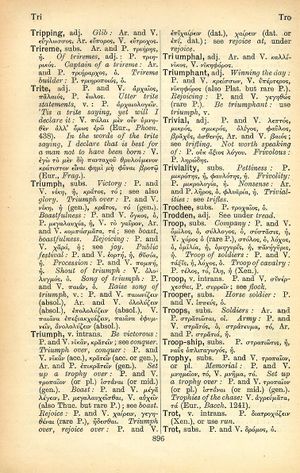trite
Οὐκ ἔστιν οὐδὲν κτῆμα κάλλιον φίλου → Nulla est amico pulchrior possessio → Als einen Freund gibt's keinen schöneren Besitz
English > Greek (Woodhouse)
adj.
P. and V. ἀρχαῖος, παλαιός, P. ἕωλος.
Utter trite statements, v.: P. ἀρχαιολογεῖν.
'Tis a trite saying, yet will I declare it: V. πάλαι μὲν οὖν ὑμνηθὲν ἀλλʼ ὅμως ἐρῶ (Eur., Phoen. 438).
In the words of the trite saying, I declare that is best for a man not to have been born: V. ἐγὼ τὸ μὲν δὴ πανταχοῦ θρυλούμενον κράτιστον εἶναι φημὶ μὴ φῦναι βροτῷ (Eur., Frag.).
Latin > English (Lewis & Short)
trĭtē: ēs, f., = τρίτη; in music,
I the third string or tone in the musical scale, Vitr. 5, 4.
Latin > French (Gaffiot 2016)
(1) trĭtē, ēs, f. (τρίτη), troisième corde d’un instrument de musique : Vitr. Arch. 5, 4, 5 ; Ps. Censor. Frg. 12, 5 || tierce [musique] : Vitr.
Latin > German (Georges)
tritē, ēs, f. (τρίτη), in der Musik = die Terz, trite synemmenon, das e, trite diezeugmenon, das eingestrichene e, trite hyperbolaeon, das eingestrichene f., Vitr. 5, 4, 5. Censor. fr. 12, 3.
Latin > English
trite trites N F :: 3rd string; 3rd tone-in-scale; third string of tetrachord reckoned from nete

